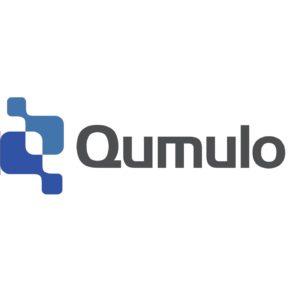Today Qumulo announced its 2020 data storage predictions. Qumulo’s predictions are guided by the enterprise’s realization that legacy scale-out and scale-up NAS storage solutions were not designed to handle today’s unstructured data volumes, distributed geographies and diverse file types. In 2020, enterprise organizations will focus on their data-driven businesses, rather than on managing their storage.
According to Molly Presley, Global Product Marketing Director at Qumulo, the following major trends will emerge in 2020:
- NVMe file storage will be adopted broadly for performance starved, low-latency applications. NVMe is a communications protocol explicitly developed to optimized all-flash storage. NVMe enables an application to get the full performance out of the SSD storage devices that previously were not being optimally leveraged. It is geared for enterprise workloads that require top performance, such as video post-production, scientific research applications, financial service analytic applications and other latency-sensitive workloads. By the end of 2020, all NVMe file storage will be dominated by players that can deliver end-to-end value and performance to applications by optimizing the network, protocol interfaces, file system software and storage to eliminate bottlenecks.
- Data-driven businesses will shift more workloads to the cloud for data processing, machine learning (ML) and artificial intelligence (AI). Every major enterprise in the world is going to become a hybrid enterprise. The public cloud gives organizations access to virtually unlimited compute power and a wide variety of applications not available in their data centers. According to a report, Hybrid Cloud Trends and the Role of Active Unstructured Data, prepared by ESG, 85% of organizations have distributed unstructured data workloads today that span multiple data centers. By the end of 2020, the majority of these will include a public cloud component for cloud application processing work.
- Modern file storage will become the preferred technology for on-prem unstructured data active archives. Modern file storage solutions deliver performance and economics in a single-tier solution managed by intelligent caching. Legacy NAS architectures with scale limitations and object storage, which introduce tiering into the workload, are not the best fit for customers seeking simplicity to deliver application performance and cost-effective retention. Modern file storage meets all of the needs of an unstructured data environment: extreme scale, high performance, cost-effective. As the scale and geographic distribution limitations emerged in legacy NAS environments, object storage was developed. By the end of 2020, we expect to see modern file storage to be fully adopted as the solution of choice on-premises, driving simplicity, performance and economics from a single solution. In hybrid and cloud environments, modern file storage will manage data ingest and active data processing, then move data to cloud object stores such as S3 and glacier for retention.
- Single-tier solutions delivering the simplicity users desire will gain favor over multiple-tier storage solutions. Enterprise organizations have been relying on tiering systems to manage the location of data and to get to a blended price point for the entire system. Many storage environments will have a variety of storage technology: SSD, disk and cloud. However, customers shouldn’t have to manage these storage technologies via policies that move data up and down the tiers; the system should be able to manage automatically. Through 2020, customers will increasingly require single-tier file storage solutions that automate the process of leveraging memory, cache and capacity storage without IT intervention or affecting application performance and user workflows.
- Enterprise, distributed, cloud-native file systems will enable customers to shift to the cloud faster without compromising on features or scale. Enterprises are eager to take advantage of the benefits offered by the cloud and to have these cloud resources as an integral part of their overall data environments. However, file system technology limitations have slowed this adoption for unstructured data in the cloud. Many of the cloud-native file services lack enterprise features such as sharing data across SMB and NFS for Linux, Windows and Mac environments. They also lack the ability to snapshot and replicate across on-prem and multi-cloud environments. In parallel, constraints with legacy file systems in the datacenter limit their use in the cloud, particularly for active data. Over the next twelve months, file in the cloud will land on enterprise-proven, cloud-native file systems that offer the same capabilities on-prem, in the cloud and across hybrid environments.
- Data awareness will be built into all technologies to help customers with massive volumes of unstructured data. One of the greatest challenges in file storage, at scale, has been knowing what data you have, who is using it, how it is growing, and where bottlenecks are occurring. Data-driven organizations require real-time analytical tools to make well-informed decisions regarding their data. Unstructured data is directly tied to better decision making and increasing competitiveness in delivering new products and business strategies. In 2020, vendors will need to help customers understand which of their data is hot or cold and organize and curate this data by their own business logic.
- Customer experience will become as important as product features. Users have long been frustrated by difficult access to experts when support tickets are opened. They are angered by technology lock-in when they choose their solutions. And, they have felt they have to strategize to get what they require out of their storage vendors instead of it feeling like a partnership for success. Storage and infrastructure vendors have historically adopted the philosophy that after landing a sale, everything else falls to support. However, the world has changed. Instead of trying to win business, successful vendors must look to make customers data-driven organizations successful. Products that compete on speeds and feeds will be beaten by those that compete on partnership and user experience. The vendors that will take market share in 2020 will not only create a product that meets business requirements and workflow demands, but will also have all the business systems, communication tools and corporate culture to ensure customers are successful for years into the future. Gone are the days of customer escalations, lengthy hold times and inflexible support policies.
Qumulo is the leader in enterprise-proven hybrid cloud file storage, providing real-time visibility, scale and control of your data across on-prem and the cloud. Qumulo’s real-time analytics help save time and money while increasing performance. Built to scale across the data center and cloud, Qumulo’s software-defined file system enables programmatic configuration and management of usage, capacity and performance. Qumulo has completely redefined customer success by continuously delighting customers with new capabilities, 100 percent-usable capacity and direct access to experts.
Sign up for our insideHPC Newsletter






